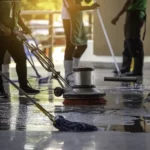Safeguarding Community Assets: A golf clubhouse and local RSL sub-branch in Victoria’s Macedon Ranges has been destroyed by fire overnight.
The recent devastation caused by the fire in Victoria’s Macedon Ranges, particularly the loss of the Gisborne Golf Club and Gisborne RSL Sub Branch, underscores the critical importance of rigorous and consistent cleaning protocols, especially in communal spaces and public buildings. Among the foremost considerations in fire protection are effective cleaning practices. The accumulation of dust, dirt, and flammable materials significantly heightens the risk of fires spreading rapidly. Regular cleaning is paramount in mitigating these hazards by reducing fuel sources and maintaining clear pathways for emergency responders. This entails routine dusting, vacuuming, and decluttering to minimize potential risks.
Furthermore, comprehensive cleaning efforts play a pivotal role in reducing the likelihood of electrical fires and equipment malfunctions. By prolonging the lifespan of building materials and electrical systems, thorough maintenance helps safeguard against infrastructure deterioration, thereby decreasing risks for residents and minimizing the severity of fire incidents. The tragic loss of the clubhouse and irreplaceable artifacts housed by the RSL Sub Branch in the aftermath of the Gisborne Golf Club fire serves as a poignant reminder of the catastrophic consequences stemming from neglecting cleaning and maintenance duties.
In addition to the physical damage inflicted, such events disrupt community cohesion by depriving locals of vital communal hubs and cultural institutions. Organizations and facility managers must prioritize robust cleaning initiatives supported by regular maintenance schedules and inspections to prevent similar disasters in the future. Beyond fortifying defenses against fire hazards, this proactive approach fosters community resilience, enhances overall health, and bolsters safety standards.
As Gisborne and its environs grapple with the loss of this cherished landmark, the importance of investing in comprehensive cleaning practices becomes increasingly evident. By recognizing the significance of cleanliness in fire prevention and facility management, we can safeguard shared spaces and preserve the rich history and memories they encapsulate.
CIOS Cleaning and Detailing stands at the forefront of promoting these ideals. With a commitment to excellence and attention to detail, CIOS Cleaning Services offers comprehensive solutions tailored to the specific needs of public buildings, community centers, and cultural establishments. Through meticulous cleaning protocols and proactive maintenance strategies, CIOS Cleaning ensures that communal assets are safeguarded against fire risks and maintained to the highest standards of cleanliness.
By partnering with CIOS Cleaning, organizations can rest assured that their facilities are in capable hands, reducing the likelihood of catastrophic events and fostering a safer, more resilient community. With a shared dedication to preserving our collective heritage and ensuring the well- being of residents, CIOS Cleaning and its clients work together to uphold the highest standards of cleanliness and fire safety.
In conclusion, the recent tragedy in the Macedon Ranges serves as a stark reminder of the indispensable role of thorough cleaning in mitigating fire risks and safeguarding community assets. By prioritizing cleanliness and embracing proactive maintenance practices, we can protect our shared spaces, uphold our cultural heritage, and strengthen the fabric of our communities for generations to come.
The CIOS Approach to Environmental Responsibility
As the debate over mechanical beach cleaning machines intensifies across Australia, CIOS Cleaning and Detailing stands out as a beacon of environmental responsibility. With a commitment to sustainability and preserving natural beauty, CIOS is at the forefront of rethinking traditional cleaning methods.
In recent years, the use of mechanical rakes has become ubiquitous on many of Australia’s iconic beaches. However, concerns about their effectiveness and environmental impact have prompted a reassessment of these practices. Victoria’s Mornington Peninsula Council’s decision to cease using these machines serves as a wake-up call for other councils nationwide.
CIOS Cleaning recognizes the importance of balancing cleanliness with environmental conservation. Instead of relying solely on mechanical methods, CIOS employs a multifaceted approach that prioritizes sustainability. By integrating manual cleaning techniques, such as hand-picking litter and using eco-friendly products, CIOS ensures minimal disruption to delicate coastal ecosystems. One of the key criticisms leveled against mechanical beach cleaning machines is their limited effectiveness in removing small debris and microplastics. While these machines may excel at clearing larger items, they often overlook finer particles that pose significant ecological threats. CIOS acknowledges this challenge and has tailored its cleaning strategies accordingly, adopting meticulous methods to address even the smallest traces of pollution.
Moreover, the reliance on mechanical rakes can inadvertently harm marine life and disrupt natural habitats. From disturbing nesting sites for shorebirds to inadvertently trapping marine organisms, these machines can have unintended consequences for coastal biodiversity. CIOS recognizes the interconnectedness of all life forms within these ecosystems and prioritizes practices that minimize harm.
Beyond environmental considerations, CIOS also emphasizes the importance of community engagement and education. By partnering with local schools and community groups, CIOS promotes awareness about the importance of preserving beaches and coastal environments. Through interactive workshops and beach cleanup events, CIOS fosters a sense of stewardship among residents and visitors alike.
In light of the growing scrutiny surrounding mechanical beach cleaning, CIOS’s approach offers a compelling alternative rooted in sustainability and environmental stewardship. By prioritizing manual techniques and community involvement, CIOS sets a new standard for responsible beach maintenance.
As other councils reconsider their cleaning practices in response to mounting concerns, CIOS serves as a model for embracing innovative solutions that prioritize both cleanliness and ecological integrity. By championing a holistic approach to beach cleaning, CIOS demonstrates that environmental responsibility and effective maintenance can go hand in hand.
In conclusion, the debate over mechanical beach cleaning machines underscores the need for a paradigm shift in how we approach coastal maintenance. CIOS Cleaning and Detailing leads by example, showing that through thoughtful strategies and community engagement, we can safeguard our beaches for generations to come. As we look to the future, let us follow in CIOS’s footsteps, embracing sustainable practices that honor and protect our natural treasures.




